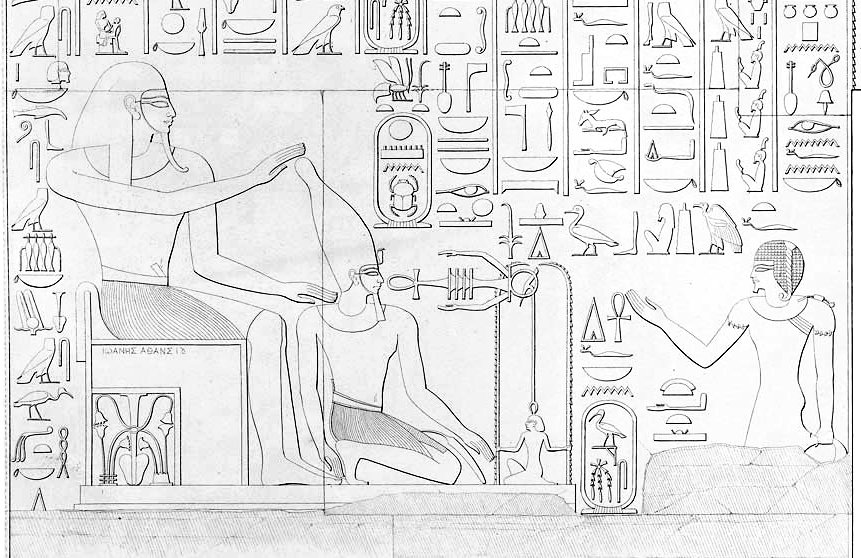Dedwen on:
[Wikipedia]
[Google]
[Amazon]
 Dedun (or Dedwen) was a
Dedun (or Dedwen) was a
 Dedun (or Dedwen) was a
Dedun (or Dedwen) was a Nubia
Nubia () (Nobiin: Nobīn, ) is a region along the Nile river encompassing the area between the first cataract of the Nile (just south of Aswan in southern Egypt) and the confluence of the Blue and White Niles (in Khartoum in central Sudan), or ...
n god worshipped during ancient times in ancient Egypt and Sudan
Sudan ( or ; ar, السودان, as-Sūdān, officially the Republic of the Sudan ( ar, جمهورية السودان, link=no, Jumhūriyyat as-Sūdān), is a country in Northeast Africa. It shares borders with the Central African Republic t ...
and attested as early as 2400 BC. There is much uncertainty about his original nature, especially since he was depicted as a lion
The lion (''Panthera leo'') is a large Felidae, cat of the genus ''Panthera'' native to Africa and India. It has a muscular, broad-chested body; short, rounded head; round ears; and a hairy tuft at the end of its tail. It is sexually dimorphi ...
, a role which usually was assigned to the son of another deity. Nothing is known of the earlier Nubian mythology from which this deity arose, however. The earliest known information in Egyptian writing
Egyptian hieroglyphs (, ) were the formal writing system used in Ancient Egypt, used for writing the Egyptian language. Hieroglyphs combined logographic, syllabic and alphabetic elements, with some 1,000 distinct characters.There were about 1,00 ...
s about Dedun indicates that he already had become a god of incense
Incense is aromatic biotic material that releases fragrant smoke when burnt. The term is used for either the material or the aroma. Incense is used for aesthetic reasons, religious worship, aromatherapy, meditation, and ceremony. It may also be ...
by the time of the writings. Since at this historical point, incense was an extremely expensive luxury commodity and Nubia was the source of much of it, he was quite an important deity. The wealth that the trade in incense delivered to Nubia led to his being identified by them as the god of prosperity
Prosperity is the flourishing, thriving, good fortune and successful social status. Prosperity often produces profuse wealth including other factors which can be profusely wealthy in all degrees, such as happiness and health.
Competing notion ...
, and of wealth
Wealth is the abundance of Value (economics), valuable financial assets or property, physical possessions which can be converted into a form that can be used for financial transaction, transactions. This includes the core meaning as held in the ...
in particular.
He is said to have been associated with a fire that threatened to destroy the other deities, however, leading many Nubiologists to speculate that there may have been a great fire at a shared complex of temples to different deities, that started in a temple of Dedun, although there are no candidate events known for this.
Although mentioned in the Pyramid Texts
The Pyramid Texts are the oldest ancient Egyptian funerary texts, dating to the late Old Kingdom. They are the earliest known corpus of ancient Egyptian religious texts. Written in Old Egyptian, the pyramid texts were carved onto the subterranea ...
of ancient Egypt as being a Nubian deity, there is no evidence that Dedun was worshipped by the Egyptians, nor that he was worshipped in any location north of Swenet
Aswan (, also ; ar, أسوان, ʾAswān ; cop, Ⲥⲟⲩⲁⲛ ) is a city in Southern Egypt, and is the capital of the Aswan Governorate.
Aswan is a busy market and tourist centre located just north of the Aswan Dam on the east bank of the ...
(contemporary Aswan), which was considered the most southerly city of Ancient Egypt. Nevertheless, in the Middle Kingdom of Egypt
The Middle Kingdom of Egypt (also known as The Period of Reunification) is the period in the history of ancient Egypt following a period of political division known as the First Intermediate Period. The Middle Kingdom lasted from approximatel ...
, during the Egyptian rule over Kush
Kush or Cush may refer to:
Bible
* Cush (Bible), two people and one or more places in the Hebrew Bible
Places
* Kush (mountain), a mountain near Kalat, Pakistan Balochistan
* Kush (satrapy), a satrapy of the Achaemenid Empire
* Hindu Kush, a m ...
, Dedun was said by the Egyptians to be the protector of deceased Nubian rulers and their god of incense, thereby associated with funerary rites.
Atlanersa
Atlanersa (also Atlanarsa) was a Kushite ruler of the Napatan kingdom of Nubia, reigning for about a decade in the mid-7th century BC. He was the successor of Tantamani, the last ruler of the 25th Dynasty of Egypt, and possibly a son of Tahar ...
, a Kushite ruler of the Napatan kingdom of Nubia
Nubia () (Nobiin: Nobīn, ) is a region along the Nile river encompassing the area between the first cataract of the Nile (just south of Aswan in southern Egypt) and the confluence of the Blue and White Niles (in Khartoum in central Sudan), or ...
, is known to have started a temple dedicated to the syncretic
Syncretism () is the practice of combining different beliefs and various schools of thought. Syncretism involves the merging or assimilation of several originally discrete traditions, especially in the theology and mythology of religion, thu ...
god Osiris
Osiris (, from Egyptian ''wsjr'', cop, ⲟⲩⲥⲓⲣⲉ , ; Phoenician: 𐤀𐤎𐤓, romanized: ʾsr) is the god of fertility, agriculture, the afterlife, the dead, resurrection, life, and vegetation in ancient Egyptian religion. He was ...
-Dedun at Jebel Barkal
Jebel Barkal or Gebel Barkal ( ar, جبل بركل) is a mesa or large rock outcrop located 400 km north of Khartoum, next to Karima in Northern State in Sudan, on the Nile River, in the region that is sometimes called Nubia. The jebel is 10 ...
.
References